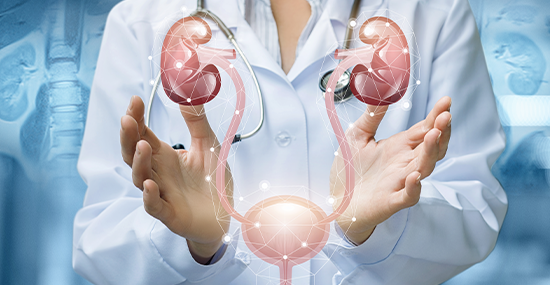
Kidney Failure
The kidneys are bean-shaped organs, each about 10 centimeters (4 inches) long. They are positioned in the back of the body behind the lower ribs. A healthy kidney is basically a filtering system. In fact, each kidney is made up of about a million filtering units called nephrons. As blood passes through the kidneys, it is "cleaned" - the body's waste products and excess fluid are removed. These waste products, along with the excess fluid, are then sent through the ureters to the bladder. Then they are passed out of the body as urine. Healthy kidneys also balance the chemicals in the blood, and produce hormones which control blood pressure and maintain healthy blood cells and bones.
What causes kidney failure?
There are a number of known causes of kidney failure but in quite a lot of people the cause is never found. The commonest causes are diabetes, high blood pressure and a painless inflammation of the kidneys called glomerulonephritis. There is a progressive loss of the filtering units (nephrons) in the kidney. Other common causes are the inherited condition of cysts in the kidneys (polycystic kidney disease); repeated kidney infections or kidney infections (pyelonephritis) in childhood; and obstruction to the urine flow.
The most common causes of kidney failure:
- Diabetes
- High blood pressure
- Glomerulonephritis (acute inflammation of the kidney)
- Polycystic kidney disease
- Scarring from kidney infection in childhood
- Obstruction of the ureters mainly caused by stones
What happens when the kidneys fail?
If the kidneys are damaged, they may carry on producing urine but become less efficient at removing waste products from the blood. Instead, the waste products continue to circulate and build up in the bloodstream. At the same time, without the hormones that a healthy kidney would produce, the bone marrow becomes less efficient at producing red cells, so anemia develops. For some patients, this may be a very gradual process. Over time, however, it can cause quite a wide range of symptoms. Not everyone will experience all the symptoms. Also, because it can be such a gradual process, some people don't even realize the effect the symptoms are having until - with treatment - they begin to feel better. Once the kidney problem has been diagnosed, regular blood tests will be required. Treatment with a variety of drugs may be needed, for example, to control blood pressure. Remember, your treatment may be changed quite frequently based on the results of your blood tests. You may require dialysis at some time in the future.
What are the symptoms of kidney failure?
- Generally feeling ill
- Lacking interest in everyday activities; difficulty in concentrating or relaxing
- Tiredness and loss of energy
- Shortness of breath
- Altered taste sensation/appetite
- Increased night-time urine production
- Sickness and nausea
- Loss of libido/sex drive
- Itching
- Swelling of the legs

